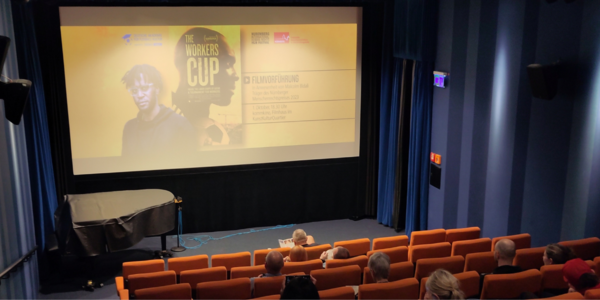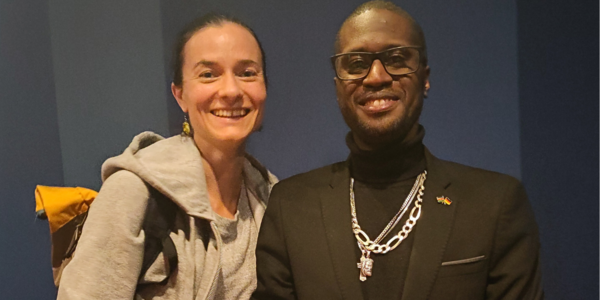Film screening of “The Workers Cup” at the Human Rights Film Festival in Nuremberg
Last week, we had the great honor of being invited to the film screening of the documentary “The Workers Cup” in Nuremberg. The screening was organized by the Nuremberg International Human Rights Film Festival (NIHRFF) together with the Human Rights Office of the City of Nuremberg and the German Academy for Football Culture.
The Workers Cup from 2017 shows the living and working conditions of African and Asian migrant workers in Qatar, but also tells of the soccer tournament organized for them, which is called the Workers Cup.
The film shows the annual soccer tournament organized by the Qatari Workers' Welfare Association in the huge, partly half-finished stadiums in Doha, in which teams from local construction companies compete against each other. However, the participating migrant workers are not only playing for the cash prizes on offer, but also for their companies. It soon becomes clear that the tournament is also part of an image campaign.
Even though the Workers Cup is organized annually, the promised reforms to labour law are not implemented and after the games the workers have to return to their camps and their exploitative working lives.
While playing soccer, the migrant workers participating in the Workers Cup forget, if only temporarily, their disappointment that many of them were deceived by recruiters in their home countries before signing employment contracts, lured into the country with false promises and are now working for half the salaries they were promised.
The subsequent panel discussion with Kenyan human rights activist Malcolm Bidali, who was also awarded the Nuremberg Human Rights Prize in 2023, focused, among other things, on the question of whether the film authentically portrays the working situation and living conditions of migrant workers in Qatar and whether anything has changed or improved since the film was shot in 2017. Malcolm Bidali talked about his personal experiences and how they corresponded with the fates portrayed in the film. He also reported that nothing had really changed since the filming or since the 2022 FIFA World Cup was held. Although the kafala system has been officially abolished, in reality migrant workers are still unable to decide for themselves whether to change jobs or leave Qatar.
Bidali gave an insight into the work of the organization MigrantDefenders, which he founded and which campaigns for migrant workers who want to return to Kenya.
When asked how people in Germany could support his work and his organization, Bidali replied that people should get involved with migrant workers and relevant organizations in Germany. This is because the exploitation of migrant workers is not a Qatari problem, but a global injustice that is documented in Germany and throughout Europe - for example among harvest workers, care workers and construction workers.
We were delighted to meet Malcolm Bidali - who we invited to Austria for a speaker's tour as part of the Our Game for Human Rights project in 2022 - again after two years and to talk to him about the current situation in Qatar and his commitment!





